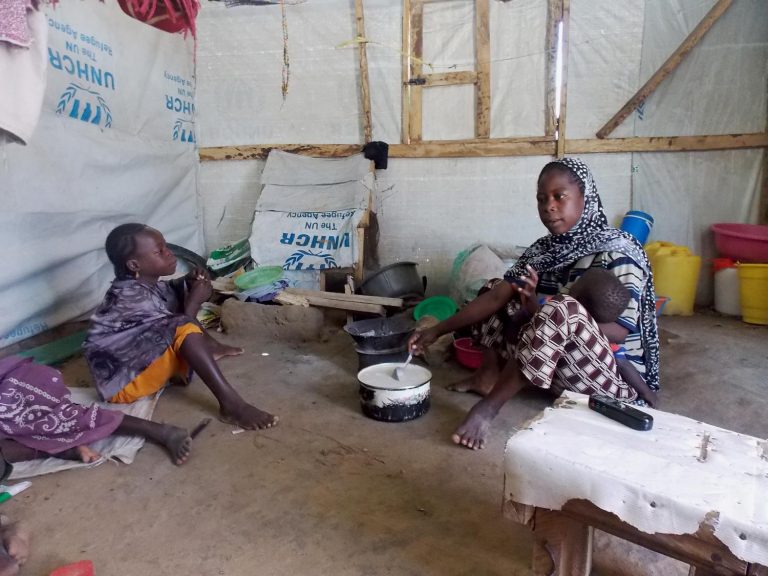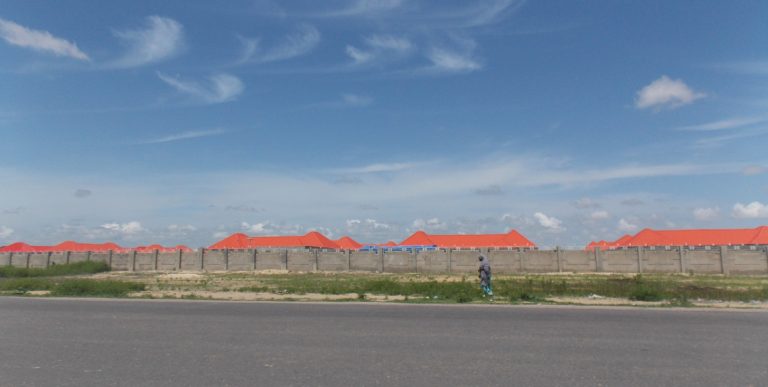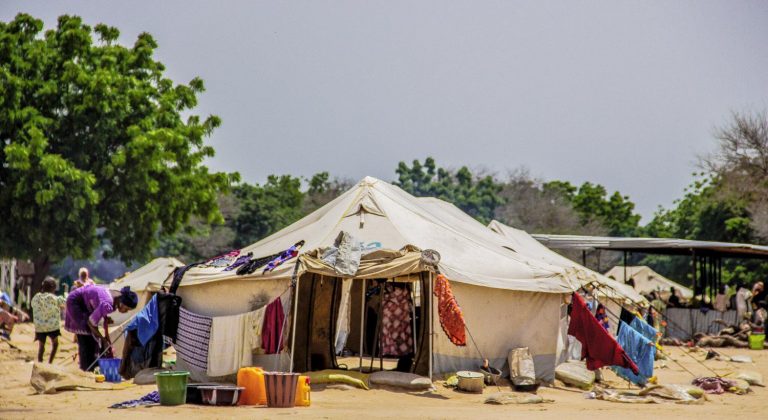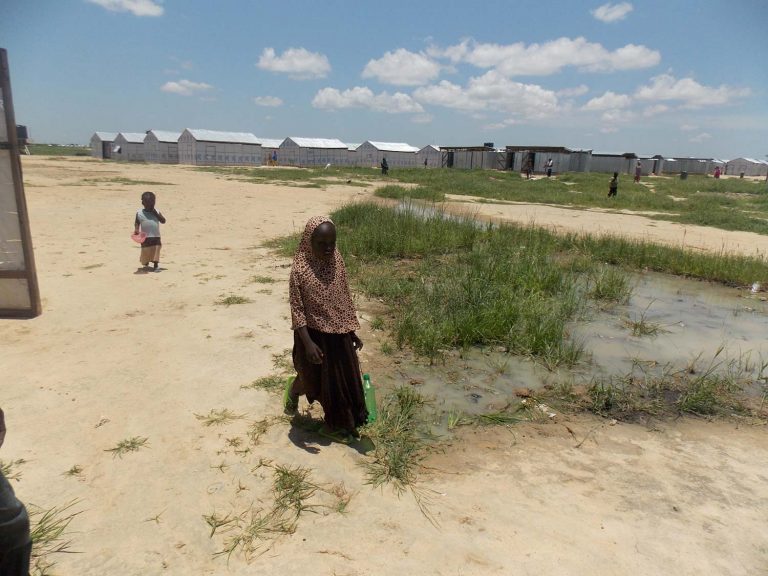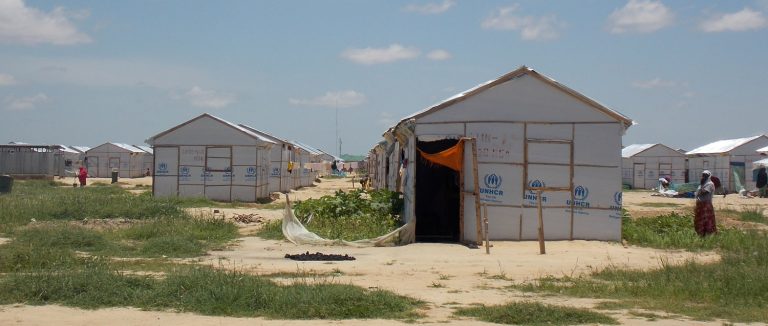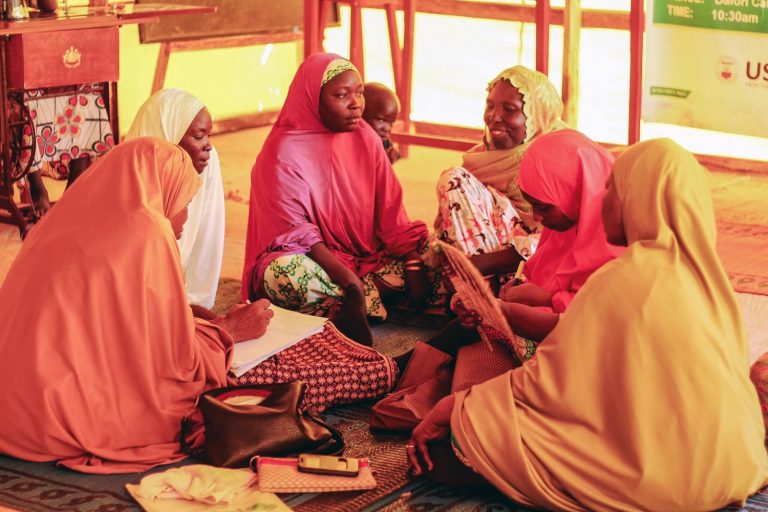Exactly twenty-four hours after I’d left Maiduguri, in Borno State, north-eastern Nigeria, the city where Boko Haram first sprung from, hundreds of shabbily dressed people poured onto the windswept streets demanding food.
A friend I’d met during my visit to the ancient capital drew my attention to the news on Facebook. As events unfolded, I followed the story from my home in Abuja, five hundred miles south of the troubled region.
The protesters were internally displaced persons (or IDPs) who, driven by hunger and desperation, had taken to the streets to protest neglect. It was easy for me to visualise how, with what little energy they had left in their bodies, they’d trudged onto the Maiduguri–Kano Road in worn flip-flops, cutting off traffic, waving their fists in the air. In the crowd I imagined the faces of Sa’adatu and Zahra, people I had been with only hours before, people who had survived the indiscriminate bullets of Boko Haram, only to be forced out of their homes and into the relative safety of Maiduguri and its dreary camps for displaced persons.
‘Our children are dying,’ Bashir Musty, one of the protesters said, ‘many are sick as a result of lack of food. All we are saying is we need food to feed our family.’ When I read this in newspaper reports, it was the image of Sa’adatu’s three hungry children lying on empty sacks on the floor of their shack, wheezing like dying animals, that came to my mind. The image had stuck and it refused to go away.
*
Since Boko Haram began its insurgency in 2011, over two million people have been displaced from their homes in north-eastern Nigeria, northern Cameroon and southern Niger Republic. Only twenty per cent of these individuals are housed in established camps, most of which are in and around Maiduguri. The others have melded into host communities where they live in uncompleted buildings or temporary shacks set up in open fields. Some of them have fled as far south as the nation’s capital, Abuja, over five-hundred miles away, and where there are about thirty camps for IDPs. Some have gone even further south.
Sa’adatu Musa couldn’t travel south. Not that she wanted to. She is forty-five, has nine children – the oldest fifteen, the youngest just over a year old – and a husband who she hasn’t seen or heard from in ten months.
On the bare floor of her tarpaulin shack, Sa’adatu sat with her legs stretched out before her, cradling her baby, as she shoved a nipple in his mouth. With one hand she brushed the sand out of his hair; with the other she stirred the gruel she was making on an open flame in what was effectively her living room. In one corner there was an array of plastic utensils – buckets, jerrycans and a basin for collecting and storing water – and a stack of old aluminium plates, all clean and dry in a tray on the floor. Next to these were three of Sa’adatu’s nine children. They were lying on empty grain sacks spread out on the bare floor, their ribs disturbingly visible. They were skinny and weak and hungry.
‘They haven’t eaten in days,’ Sa’adatu told me as I sat on a stool across the room from her. ‘I went out and begged and someone gave me fifty naira. I bought some corn flour with it and I am making this for them.’ She stirred the gruel in the old, soot-covered pot.
Sa’adatu and her children waiting for food
Multiple reports of displaced persons dying of hunger surfaced in June and July 2016, prompting angry reactions and rebuttals from the Nigerian government and the government of Borno State, where the bulk of the displaced persons are from and where over one and a half million IDPs are currently located. Deaths from hunger may not be prevalent in the many camps around Maiduguri, but they are a reality in camps elsewhere in the state, in Bama, for instance.
In June 2016, photos emerged on social media of government officials re-bagging food meant for the IDPs to sell in the markets. The commandeering of relief materials for IDPs is a common occurrence here. Nutritious milk that UNICEF has designated for starving children regularly turns up in shops, where it sells for about a dollar. Looking at Sa’adatu’s children, I imagined how much they could do with that milk – or any milk for that matter.
This disturbing scene wasn’t what I had expected when I arrived at the Bakassi camp. Woolly clouds flecked the blue sky hanging over the red-and-blue aluminium roofs of a fenced-off but unfinished housing estate. The estate is so expansive one would have thought all the displaced persons in Maiduguri could fit into it. The picturesque scenery was disarming, so much so that when the reality beyond the fence hit, it was brutal.
I had arrived in Maiduguri days before. After spending a whole day in the 7th Division Headquarters of the Nigerian Army in Maiduguri, trying to secure authorisation to visit the camps, I was handed a letter on fine quality glossy paper, asking me to return to Abuja and apply through the army headquarters in Nigeria’s capital. The whole process would take at least five days. I couldn’t understand it. I wanted to write a happy story about the camps, about IDPs finding love and dreaming of returning home. What was the military afraid of? And who on earth would waste such a beautiful piece of paper, glossy and all, just to turn down my request?
A major in the army, smiling effusively as he swivelled in his chair, took the time to explain why they were being so cautious. They had had lots of negative reports from journalists; and they needed to protect the integrity of the IDPs. I listened to him, sipping the soft drink he had offered me from his office fridge. I understood why they had to be careful; the Nigerian Army hasn’t always had the greatest reputation for civility. Their notoriety for dishing out corporal punishment to civilians on the streets was firmly established during the succession of military regimes between 1966–1999.
Recently, there have been reports that the soldiers and vigilantes guarding the camps have been exchanging food for sex with desperate inhabitants of the camps. Some IDPs have become pregnant as a result. I found myself wondering if, desperate as she was to feed her children, Sa’adatu would eventually succumb to something similar. There is nothing hunger will not drive people to.
Without authorisation, I managed to make my way into the Bakassi Camp early the next morning.
A woman walking past the Bakassi Camp in Maiduguri
What has become the Bakassi Camp was conceived as a luxury estate for the high and mighty. Driving in through gates manned by the military and local vigilantes, one is confronted by expansive flats stretching into the distance. They are still unpainted. Built with public funds, a government official tried to appropriate the choice real estate for private use, but after another round of elections new officials seized the property and put it to use as a camp for IDPs.
Beyond the luxury flats, endless rows of tarpaulin shelters have been set up to accommodate more and more IDPs pouring in from different parts of Borno, from areas that have been occupied or attacked by Boko Haram. Nearly thirty thousand people live in the Bakassi camp.
Sa’adatu is from Gwoza, eighty-five miles south-east of Maiduguri. In 2014, when Boko Haram was at the height of its powers, the town came under sporadic attack. Sa’adatu’s husband, Musa Adamu – who had two other wives and a total of nineteen children – was just recovering from surgery and contemplating moving his family to a more secure location.
‘We heard stories of “the boys” ambushing people on the way and killing them,’ she said, referring to Boko Haram. Boko Haram do not like being called Boko Haram, which they see as derogatory, and those who have lived within reach of their reign of terror have found other euphemisms for them. Afraid they would be waylaid if they left, she and her family stayed on in Gwoza, hoping to ride out the trouble. But after the Eid feast of July 2014, Boko Haram tightened its grip around their town and they realised they couldn’t stay any longer. The possibility of fleeing into an ambush became more enticing than waiting to be gunned down in their homes.
‘If the boys had stopped us on the way, it would have been Allah’s will,’ she said, stirring the steaming gruel. I wondered if the meal was being overcooked when I noticed how mildly the flame was burning, licking the bottom of the pot without commitment. One of Sa’adatu’s daughters walked in, aged about ten, her skin dripping with water. She had just had her bath in one of the toilets in camp, of which there were several. Made of roofing sheets, these are strategically located to avoid overcrowding. Hand-pumped boreholes provide water, so Sa’adatu’s water-storage utensils were left empty in the corner of the room. The girl sat opposite her mother, looking into the pot while pretending to twiddle with her toes.
Back in 2014, Sa’adatu had packed carefully. They took utensils, bedding and a supply of food, both cooked and uncooked. She loaded this onto the heads of her children, strapped her last born, only a few weeks old then, on her back, and together with her husband set out on foot. They trekked for two days and a night, avoiding major roads and towns, until they arrived at a military facility.
A tent shelter for Internally Displaced Persons in north-east Nigeria, where over two million people have been displaced by Boko Haram
The soldiers don’t know who the enemy is, because Boko Haram is not a conventional army. As a result, the family was detained and questioned for days. If they were judged to be Boko Haram sympathisers, their fate would be sealed. The saving grace, Sa’adatu said, was that someone the military trusted vouched for them.
‘The man knew my husband and told them he was certain that we weren’t involved with Boko Haram. He told them he knew us very well and had last seen my husband a month before,’ she said.
Perhaps if he hadn’t added the last sentence, things might have turned out differently. The soldiers wanted to look into that one-month window. The whole family was transferred to Giwa barracks in Maiduguri, which had become notorious as a detention centre for suspected members of the Boko Haram terror group. Amnesty International’s report in May 2016 suggested that between January and May 2016, 149 people, including children as young as five months, died at Giwa.
Sa’adatu and her husband were unaware of these figures, and even if they had heard rumours about Giwa barrack’s notoriety, anywhere was better than being held in Boko Haram’s enclave.
Sa’adatu and her children were put in a detention cell alongside other women and minors. She estimates their numbers to be around two hundred and eighty. There was no toilet, and since they were locked in between 4 p.m. and 9 a.m., they urinated and defecated in a huge plastic drum, which they took turns emptying in the morning.
The men were held in a separate building. They were not let out. So in the hours that the cell doors were thrown open to her, Sa’adatu went round the back of the men’s detention building to catch glimpses of her husband through the window.
‘I would wave at him and he would wave back,’ she said, looking at the United Nations High Commission for Refugees (UNHCR) logo printed on the white tarpaulin wall as if she could see his face there. ‘When his shirt was dirty, he would take it off and throw it through the window. I would wash it and throw it back to him so the soldiers didn’t see.’
After two months at Giwa, her husband sent her a message. He had heard they were going to be transferred to another facility for further interrogation. ‘He asked me and the children to fast and pray for him,’ she said. Sa’adatu was also worried. She had heard stories by now from other detainees, and from the soldiers too.
‘We were told that during the previous government, the men were taken and shot. But now things are better so they are only taken to be questioned. Those who are not involved in the insurgency might get out in five months. So don’t worry, they said, if your husband is innocent, he will be out in months. But we were told that if death comes, whether you are in your home or in the market, it will meet you. Some of the men may die before those five months are up.’
The next morning, Sa’adatu and the other women watched as a vehicle escorted by armed soldiers took the men away. With her little boy balanced on her hips, she watched the convoy drive towards the gates and recede into the distance, wondering when she would see her husband again. She was sure she would see him again. He had nothing the soldiers wanted; he was innocent. She was certain of that. But ten, long months have passed since that day. Her little baby has grown into a toddler, and Sa’adatu’s husband has not returned.
‘We took ourselves there,’ she said, her voice trailing off. ‘By ourselves, we took ourselves there.’
*
Two months after her husband was shipped out of Giwa barracks, Sa’adatu and her children were crammed into a vehicle and moved to the Arabic Teachers’ College camp, where over a year later hunger would drive the IDPs into the streets. She only stayed twenty days. The truck came for her again and this time she was moved to the Bakassi Camp, where another ten thousand people from Gwoza were kept. Sa’adatu felt better back among familiar faces, comforted by people who knew for certain her husband was only a victim, just as they all were.
But here, at Bakassi, new challenges arose. In the eight months she has been at the camp, the stores have remained empty. The last time supplies were replenished was over a year ago, months before she arrived. Relief materials are scarce, and the IDPs are not allowed to go out and beg for food or alms. Maiduguri is laden with whispers – whispers of trucks loaded with relief materials driving in through the front gates of the camps, and then driving out the rear gates, still fully loaded.
Children wandering around Bakassi Camp in Maiduguri
Sometimes, Sa’adatu strolls by the camp kitchen to see if the hearth is being stoked in preparation for a meal. But the ashes have been cold for weeks now and she often returns with tears stinging in her eyes, unsure what to tell the children. And with the exits from the camps tightly controlled by the soldiers and vigilantes, her chances of going out to beg for food on the streets are curtailed, and the possibility of getting news of her husband increasingly remote.
Rumours of a possible relocation to Gwoza, which might happen by the end of the year, do not excite her as they do the other IDPs, who think that back home they might be able to find food more regularly. The way Sa’adatu sighed at the rumours, I suspected a return home might have appealed if her husband was with her.
‘I don’t know where my husband is, whether he is dead or alive,’ she said, her head cocked to one side in a posture of resignation. The room is silent now, completely, save for the wheezing breath of her hungry children sleeping on the empty sack on the floor.
*
The drive across Maiduguri was laced with silence, that kind of brooding, contemplative silence in which one takes stock of things such as the essence of life and hunger and death. Classic country music rolled out of the car speakers, filling the void. Every time the car slowed down in traffic, hordes of children, and sometimes adults too, clawed at the windows, begging for charity.
‘Please help an orphan,’ they each chanted, shuffling against each other, trying to position themselves better for whatever might come out of the car. There are many of them now in Maiduguri. So many it bothers you. They are the orphans of the Boko Haram carnage, and those who pose as such victims to make some money. There will always be people who take advantage.
Beyond the forest of outstretched arms and clawing fingers, Maiduguri seemed normal, almost – a city learning to breathe again after the ravages of Boko Haram. Traders and artisans have goods on display in shops and walkways. Fancy street lamps line the roads, some imported from France to give the city the exotic ambience of Paris. I am surprised by how boisterous the city seems, bulging with life and hordes of displaced people. And the dreams that people have, even in the most troubling times.
It was here that what has become known today as Boko Haram was born, here in this city of the proud Kanuri tribe and their ancient history, the seat of the Kanem Empire. It was here that one Muhammed Yusuf started preaching a radical form of Islam in 2002, exponentially growing his militant fan base with frustrated youths. And when in 2009 the group confronted the authorities, it was here, in Maiduguri, that they were brutally crushed. Yusuf was killed along with hundreds of his followers. Other members of his sect fled and went underground, only to resurface in 2011 as the deadly terror group that would, at the peak of its powers (around January 2015), hold some twenty thousand square miles of territory – an area roughly the size of Croatia.
Our car is stopped now at a checkpoint. Young vigilantes armed with bamboo clubs, machetes and Dane guns peer into the car, looking at me, my photographer and the driver. Their bleary eyes and dope-stained lips tell of drug use. They are called the Civilian Joint Task Force. Tired of Boko Haram attacks, youths of the city took up arms to hunt down the terrorists that had risen from among them. And it is in large part thanks to them that Maiduguri is relatively free of the insurgents. The model has been replicated in other towns in the north-east, helping the military to identify and tackle members of the sect. The story of this insurgency cannot be told without their contribution, but when Boko Haram is fully subjugated, the government will have to find some use for these youths, or they too will become a problem.
For now, they are everywhere, patrolling the streets and guarding buildings. They were there at the gate of the Dalori IDP camp on the outskirts of the city, where they and the soldiers keep watch.
Dalori is one of the biggest camps in the country. Walking through the gate, one is confronted by hordes of people and endless rows of tarpaulin shelters that stretch as far as the eyes can see.
A view of the Dalori camp in Nigeria
Zahra Mohammed, a twenty-five-year-old Cameroonian, lives here. Her shack is just a single room, about six feet by ten feet. Her personal effects – plates, mats and a flimsy mattress – are scattered around the little space. You can hear voices through the tarpaulin walls separating her from her neighbours.
In the year Zahra lived here, her life consisted of waking up, washing her dishes, cleaning her room and, at about noon, joining the queues for the first meal of the day.
‘Sometimes we don’t get food, so we try to cook whatever we have scavenged or some of the relief materials we have,’ she says. She is soft-spoken, but there is sharpness in her eyes, eyes that belie the difficult times she has gone through, both here and in the forest she was rescued from.
Herwa Community Development Initiative, the NGO that offers her counselling and trains her and others in skill acquisition, euphemistically calls her a survivor. Others who are less tactful would call her a ‘Boko Haram Wife’.
*
In July 2014, Zahra was recently divorced, nursing her seven-month old baby Jamila and tending to her sick mother at a hospital in Kolofata, northern Cameroon, when she heard gunshots and explosions.
Armed men burst in, pointed their guns at her, then dragged Zahra and her child away from her mother’s bedside. She was blindfolded and thrown into a truck along with other women. One of them was the wife of the Cameroonian Deputy Prime Minister Amadou Ali, and it was primarily because of her that the Boko Haram attack on Kolofata made the local and international news. Not one of these reports mentioned Zahra Mohammed by name. She was one of the ‘other women’.
Zahra’s heart beat wildly as they drove, and she heard the sounds of the life she used to know recede into the distance. They bumped their way through rough bush paths, on and on until all that was familiar was only a memory, save her daughter clinging to her.
They were driven into the forest of Buni Yadi, where the younger women were separated from the older ones. That was the last time Zahra would see the wife of the Deputy Prime Minister, even though they were held together for three months. Every day, armed men would escort the younger women to attend classes run by Boko Haram scholars. And when new victims were captured in raids, the militants asked Zahra and the other captives to cook for them. There was a routine to that life in Buni Yadi, but that routine was soon disrupted.
One day, bombs fell out of the heavens and exploded around the militants’ camp. Screaming, the terrified women crouched on the floors, fearing a bomb would explode over their heads and that would be the end of it. But they survived.
The air raid forced Boko Haram to move camp, relocating with their hostages to another forest. At the new camp, Zahra worried about the well-being of her daughter, her son, who had been with his father when she was taken, and the fate of her ill mother left in the hospital. Her captors were contemplating other matters.
‘They said they wanted to marry me,’ Zahra said. ‘I told them I wanted to return to my parents, and they said my parents were infidels and I would never see them again.’ It was a curious proposal. If Zahra had said yes, the interested militant would have reported to the amir, or the head of the cell, that he had found a willing wife. For Boko Haram, hierarchy is important. A witness – a survivor – had told me she had seen about twenty militants executed by their commander for taking ‘wives’ without his consent. They were branded fornicators and shot. Against the wishes of the executioner, the women were spared because they were forced into the ‘marriage’. The enraged executioner had to be physically restrained from shooting the women.
Zahra did not know this, of course, but she still rejected the proposal. Spurned, the militants decided to force her hand.
‘They put me in a hole in the ground and covered it with some crude construct. They kept me there for fifteen days. And when they brought me out, I still refused,’ she said. She was fiddling with her fingers now.
She sat staring out of the door to where the other women were sitting in the shade, braiding their hair and speaking in Kanuri. I imagined how she must have felt in those seven months of her captivity, losing all contact with home and everyone she had loved. I wondered if she heard when the government of Cameroon negotiated with Boko Haram for the release of the wife of the Deputy Prime Minister. If she had wished she was with those freed alongside the wife of the politician after the ransom was paid. I wondered how it felt to be one of the forgotten ones, and to remain one of the forgotten ones years later.
With no news of home, all she had was her daughter, Jamila. She held her for comfort at night and the innocent child, then fourteen months old, was the only source of joy she had.
But then the fighter jets came again. Another day, another raid. With bombs dropping, chaos broke out in the camp. The women saw an opening and fled into the forest, but were pursued by their unrelenting captors.
With little Jamila strapped to her back, Zahra ran into uncharted terrain. The wrapper she used to bind her daughter to her back came undone and Jamila tumbled off, falling to the ground and snapping her neck.
I could visualise Zahra falling to her knees, shaking her baby, asking her to wake up, calling her name and wailing to the heavens. But Jamila was dead. And when the Boko Haram militants caught up with the distraught woman, they dragged her away.
‘Your crying will not bring her back,’ they told her.
There was something almost mechanical about the way Zahra narrated her story, as if wanting to detach herself from it. Perhaps it was because she had already told it several times before, to her fellow refugees and displaced persons, to news hounds, NGOs and the international aid groups who had promised to help her find her family, all without success.
The only moment emotion crept into her voice was when she said, ‘I still think about my daughter.’ She looked down at her fingers, now dovetailed into each other. ‘I think about her all the time.’
When another military raid on their new camp at Kera Laji presented another opportunity to escape, Zahra took it. Survival was paramount in her mind. She ran. For her dead daughter. For her living son. For her sick mother, who may or may not be dead. For the love of life, she ran and did not stop, until she, along with five other women, reached Bama, which had just been retaken by the Nigerian Army.
There they were housed in the local prison for five days, until Boko Haram made a spirited attempt to retake the city. The attack was repelled and the army decided it was best to move the women to the safety of Maiduguri, to the massive camp of Dalori, where Zahra has been ever since.
*
It was Tuesday. In the bright sun of Maiduguri, close to the gate of the Dalori camp, there was a football match going on, two teams of IDPs slugging it out against each other. But for Zahra, it was just another day.
She had woken up to the humdrum life of the camp. And by noon, it was clear there wouldn’t be any food that day. The cooks were idling in the kitchen, cleaning utensils and finding ways of appearing busy, but anyone could tell nothing was happening there. Zahra would have to cook some of her rice or noodles. She had some spice she could sprinkle on them to give them a little taste. Conditions at Dalori are far better than at the Bakassi camp; at least here, food is more regular and the prospect of starving does not loom so large.
When she was told that some officials from Herwa, the NGO that has been counselling her, had come and were waiting for her at the United Nations Population Fund (UNFPA) tent, she probably didn’t think much of it. She shelved her plans to cook for the moment. Who knew, perhaps the kitchen would come alive by the time she was done.
The UNFPA tent was located near the makeshift school in the camp. It stood out from the field of white tarpaulins because it was yellow and the sunlight streaming through the tarp gave the inside of the tent an ethereal amber glow.
A counselling session for Internally Displaced Persons
There was only one Herwa official on the ground, but he had come with representatives of the Federation of Muslim Women’s Association of Nigeria (FOMWAN).
The women huddled on the mats in the middle of the tent, talking to the officials. Soon, there was a buzz of excitement. Other women who had been in separate corners joined the group in the centre. Zahra sat, her hands on her lap, looking down at the mat. She seemed dazed.
One of the FOMWAN officials was also Cameroonian, and she happened to know Zahra’s parents. She told Zahra that her mother had recovered from her illness; her family had relocated to Marwa, but they were alive and well.
It was the first news from home Zahra had received in two years. Looking at her sitting there in the midst of the women, holding back the tears in her eyes, I could see how much this bit of news meant to her. She seemed completely floored by this happy coincidence.
‘They think I am dead,’ Zahra told me later. ‘They told them I had been killed in one of the air raids in the forest. They’ve even said prayers for my soul.’
This information was hard for her to process and she didn’t seem to know how to handle the news. But beneath the confusion, there was relief. And the renewed stirring of hope, the thawing of dreams long put on ice. There would be bureaucracy and paperwork to get her out of the camp if someone came for her, but the priority now was to reach out to her parents and let them know she was alive and well.
‘I just want to see my family and my son again,’ she said. The trembling in her voice told of anxiety, of an eagerness to remove the cloak of death from over her head, to reveal herself to the world she knew and that knew her.
For Zahra, there is now a glimmer of light at the end of her long and winding tunnel. For Sa’adatu Musa and her children at Bakassi, the wait continues.
This essay was made possible by Refugees Worldwide, a project by the International Literature Festival of Berlin. Abubakar Adam Ibrahim is a Nigerian writer, whose debut novel Season of Crimson Blossoms is the winner of the NLNG Nigeria Prize for Literature, and is published by Cassava Republic Press.
Photographs © Abubakar Adam Ibrahim and Fati Abubakar

